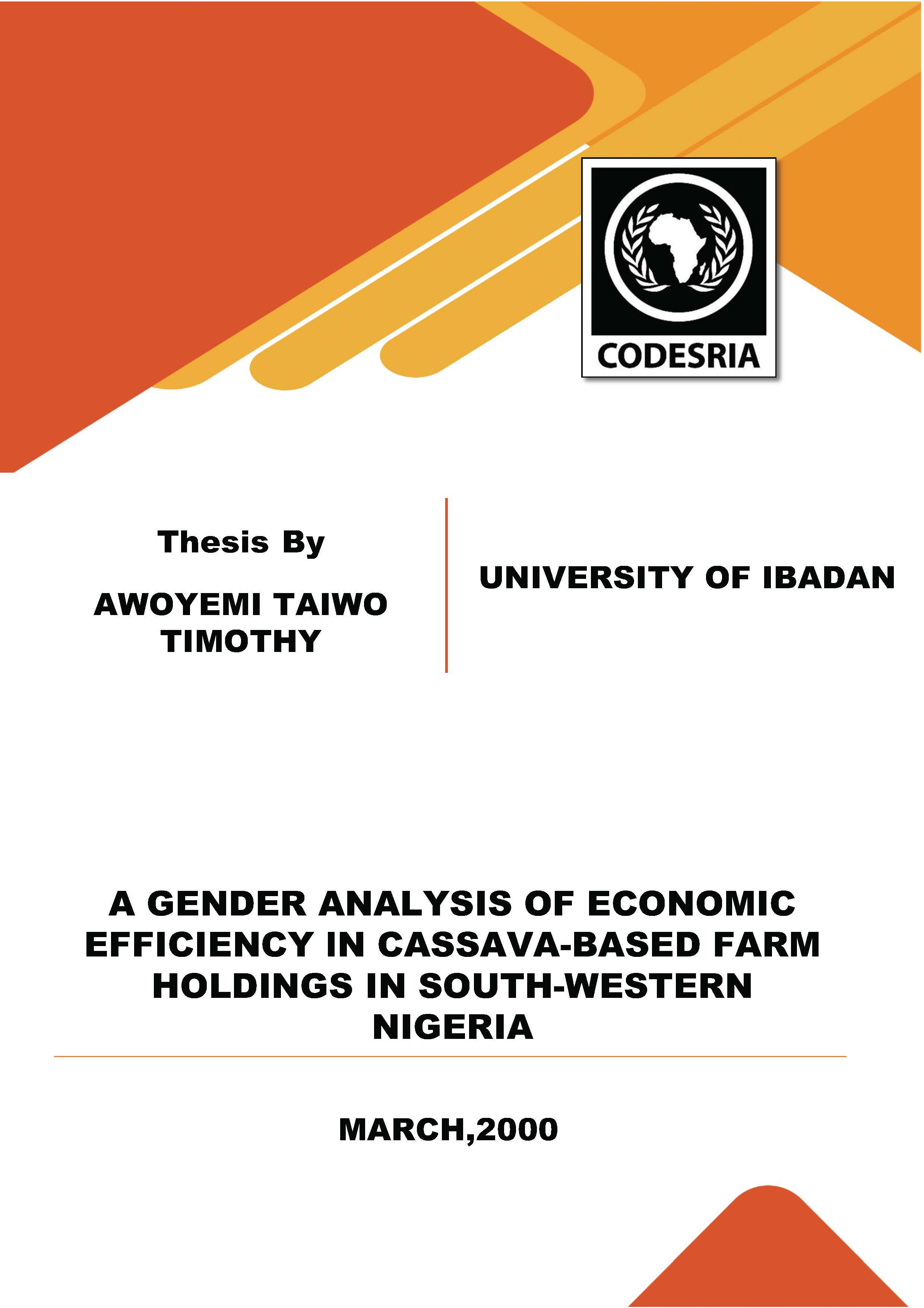A gender analysis of economic efficiency in cassava-based farm holdings in south-western Nigeria
Keywords:
Agricultural economics, agricultural policy, gender analysis, cassava, efficiency, resources allocation, cassava production, NigeriaSynopsis
The study undertook a gender analysis of economic efficiency of cassava based farm holdings with a view to enhance productivity gains through efficient intra-household allocation of resource Primary data were collected through well structured questionnaire administered to characterize the production, processing and consumption of the respondents. A combination of analytical techniques were used to analyse crosssectional data from 149 male respondents and 13 8 female respondents selected through a two-stage stratified random sampling of villages and households as well as purposive sampling of ultimate farmers in Oyo and Osun States of Nigeria. The study· employed a stochastic frontier production function and duality
model of a translog cost functional form to measure technical, allocative and economic efficiency of small scale cassava producers. ~tultivariate discriminant analysis was also used to predict whether or not an individual cassava based farmer was viable hence likely to be sustainable. The non-parametric approach adopted was that of Kendall coetlicient of concordance to test the significance of agreement among the respondents to their common problems. The results indicated that, average overall productive efficiency in the sample was 79.61 percent implying that small scale cassava farmers in the sample could reduce total variable cost by 20.39 per cent if they reduce labour, fertilizer, land and capital application to levels observed in the changing input mix (technical efficiency) and then obtain optimal input mix for the given input prices and technology
(allocative effeciency). The average technical et1iciency and allocative efficiency indexes for the sample were 82.7 per cent and 96 per cent respectively. Also, evidence from empirical analysis of data from the male respondents show that the
average economic, technical and allocative efficiency indexes for the sample were 82.7 per cent and 96 per cent respectively. Also, evidence from empirical analysis of data from the male respondents showed that the average and economic, technical
allocative efficiency indexes were 78.29per cent, 87.4 per cent and 89.58 per cent respectively while the same computed for the female sample were 72.53 per cent 95.0 per cent and 76.35 per cent respectively. Efiiciency enhancing factors were found to include farm size, labour, crop diversification, education, capital, fertilizer and quantity of output while extension contact, experience and age were not. Labour was the most limiting factor in cassava production suggesting that the technologies
that enhance the productivity of labour are likely to achieve significant positive effects on cassava pro::luction.
Downloads
References
Adepoju Aderanti and Oppong Christine (1994), (eds): "Gender, Work and Population in Sub-Saharan Africa". International Labour Office Geneva.
Adekanye (Adeyokunnu) T.0. ( I 981): "Women and Agriculture in Nigeria". United Nations Economic Commission for Africa. ST/ECA/ATRCW181/l 1. Addis Ababa, Ethiopia, 1981.
Adekanye, T.O. ( 1983): "Women in food and Agriculture in Nigeria" some considerations for Development", Bangladesh Journal
Adekanye, T.O. (I 993): "Gender Bias m African Agriculture and Sustainable Development: the case of Nigeria". Paper presented at the International Conference: Out of Margin, Feminist Perspectives of Economic Theory". Amsterdam, the Netherlands, June 1993.
Adekanye, T.O. and T.T. Awoyemi (1995) "Rural Women and Economic Restructuring in Africa, Experience from Nigera" paper presented at the Summer Conference of the International Association for Feminist Economics Tons France July 5-7, 1995.
Aigner, D., C.K. Lovell and P. Schmdit ( 1977). Formualtion of Stochastic Production Function Models. Journal of Eco110111etrics 6: 21 - 37.
Aina Tade Akin, Ademola, T.S. (Eds), (1992): The Challenge of Sustainable Development in Nigeria" An NGO Report prepared for the United Nations Conference on Environment and Development, Rio de Jumpiro Brazil, Junel-12p. 187.






